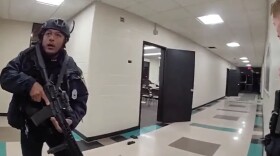The patient is having trouble remembering things – names, recent events. They and their family are worried.
The doctor asks how long it’s been going on, whether they’ve been in any accidents and if they have a family history of dementia. He does a physical and neurological exam, and orders an MRI. Based on the results, he diagnoses the patient with Alzheimer’s.
The patient, in this case, is generated by AI. It’s an app created by a professor at Dartmouth’s Geisel School of Medicine that allows medical students to practice talking to patients.
These kinds of interactions – asking a patient about their symptoms and medical history – can be critical to reaching the correct diagnosis, said Dr. Thomas Thesen, who directs the school’s neurology and neuroscience program.
But students don’t get that many opportunities to practice those skills. Hiring actors who play patients for training purposes – known as “standardized patients” – can get expensive.
So Thesen worked with a data scientist from Dartmouth’s library and a team of students to create the AI Patient Actor app.
Built on ChatGPT – but using medical scenarios supplied by human experts – the program allows students to have a conversation with a simulated patient, ask about their symptoms, order tests and enter a diagnosis.
The program then provides instant feedback – not only on whether the diagnosis was correct, but also on how the student communicated with the patient and whether they asked good questions.
Knowing how to diagnose a disease when you have all the facts is one thing, Thesen said, “but what's important is they also need to develop an intuition or an understanding of asking the right questions.”
“And that's a very different skill set,” he said.

Thesen said the app can’t recreate everything about live patient interactions. It’s meant to supplement training with real actors – not replace it.
“But overall, we hope that better training, better preparation for these patient encounters will lead to better skill levels, and ultimately better patient outcomes,” he said.
Nsomma Alilonu, a second-year medical student at Dartmouth, helped develop the app. She said the additional opportunities for practice are valuable to students like her.
“Patient interviewing is such an important skill,” she said. “I mean, most diagnoses are found during patient interviewing. And it's something I just wanted more practice with, especially in a non-pressured setting.”
Thesen said the app could also be an important tool for medical schools that don’t have as many resources to hire patient actors. It can also fill other educational gaps.
For example, he said many Dartmouth students want to improve their medical Spanish, so they can serve Spanish-speaking patients. But it’s hard to find patient actors in rural New Hampshire who speak the language. So the app has a Spanish-language setting.
Thesen is also working with a medical school in Kenya on a localized version with both English and Swahili, to serve students there.
He said a study is underway to evaluate the app’s performance, using feedback from board-certified neurologists, as well as any potential biases.
“From my experience with it so far, it's very good. And even humans make errors, so you gotta weigh it against that,” Thesen said. “But I think that's that's an important step – not just, you know, blindly trust this.”





